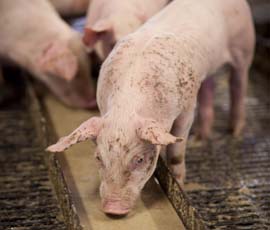Research aims to beat pig disease PWMS

New research findings could take farmers one step closer to controlling the devastating pig disease, Post Weaning Multi-systemic Wasting Syndrome (PMWS).
A project funded by the Biotechnology and Biological Sciences Research Council, published today (8 July), has identified the factors that make some farms more likely to develop the disease which is estimated to cost the UK pig industry £30m each year.
The research could help to outline best practice husbandry to enable farmers to optimise animal welfare and maintain production.
In the study, researchers at the Royal Veterinary College looked at 147 pig farms across England and found the farms with the lowest incidence of PMWS had clean, enriched environments with the maximum amount of space for pigs as possible. They also found that pigs reared outside were at considerably less risk from PMWS.
PMWS is widespread in the UK, striking young pigs from about six weeks after they are removed from their mothers; they then lose weight, have difficulty breathing and can suffer from fever and diarrhoea as they slowly become emaciated. Up to 30% of infected pigs die of the disease.
PMWS is associated with the presence of a virus called porcine circovirus type 2 (PCV2) but the virus alone does not seem to cause the syndrome. Many pigs with the virus do not develop the disease. This suggests that PMWS is only likely to develop when pigs are unhealthy for other reasons.
Dirk Werling, a professor at the RVC, explains: “We found that good animal husbandry is the best way to guard against an outbreak of PMWS. If pigs are reared outdoors, or in an enriched, clean environment, they are far less likely to get sick, even if the virus is present.
“Our research suggests that by reducing the likelihood of PMWS, improving conditions for pigs is a good investment because, in the long term, production is improved.”
Prof Werling received £2.4M for the PMWS project through the BBSRC Combating Endemic Diseases For Farm-Animal Sustainability programme (CEDFAS). As part of the project his team have been working with the British Pig Executive (BPEX) to develop monitoring tools to help farmers judge whether their farms are at high risk of PMWS.
Professor Douglas Kell, chief executive of the Biotechnology and Biological Sciences Research Council, said combating animal diseases, both in the UK and internationally, would be crucial to ensure we could provide safe, sustainable, nutritious and affordable food to all.
“PMWS is endemic to the UK, but this research demonstrates the disease can be combated in a way that saves the pig farming industry millions of pounds while also improving animal welfare.”
